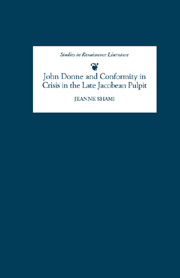Book contents
- Frontmatter
- Contents
- Dedication
- Acknowledgements
- Abbreviations
- 1 “Discreet or religious preachers”: John Donne and the late Jacobean Public Sphere
- 2 “The indiscretion of that foole”: John Knight and the Jacobean Pulpit, 1620–2
- 3 “The fishing of whales”: John Donne's Sermons, 1620–2
- 4 “Faire interpretation”: The Directions and the Crisis of Censorship
- 5 “Wise as Serpents, and innocent as Doves”: Zeal and Discretion in the Pulpit, 1623–5
- 6 “Jesus Wept”: The Journey to Spain and Pulpit Lamentation
- 7 “Blinde buzzards in the choise of a wife”: Sermons and the Moral Marketplace
- 8 “The Lovesick Spouse”: Parliament, Patriots, and the Public Sphere
- 9 “Church-quakes”: Post-Parliamentary Faultlines
- 10 “If the Foundations be Destroyed”: Rules of Engagement
- 11 “Blessed sobriety”: John Donne, the Public Sphere, and Caroline Conformity
- Works Cited
- General Index
- Index to John Donne References
- Index to John Donne's Sermons
- Studies in Renaissance Literature
7 - “Blinde buzzards in the choise of a wife”: Sermons and the Moral Marketplace
Published online by Cambridge University Press: 12 September 2012
- Frontmatter
- Contents
- Dedication
- Acknowledgements
- Abbreviations
- 1 “Discreet or religious preachers”: John Donne and the late Jacobean Public Sphere
- 2 “The indiscretion of that foole”: John Knight and the Jacobean Pulpit, 1620–2
- 3 “The fishing of whales”: John Donne's Sermons, 1620–2
- 4 “Faire interpretation”: The Directions and the Crisis of Censorship
- 5 “Wise as Serpents, and innocent as Doves”: Zeal and Discretion in the Pulpit, 1623–5
- 6 “Jesus Wept”: The Journey to Spain and Pulpit Lamentation
- 7 “Blinde buzzards in the choise of a wife”: Sermons and the Moral Marketplace
- 8 “The Lovesick Spouse”: Parliament, Patriots, and the Public Sphere
- 9 “Church-quakes”: Post-Parliamentary Faultlines
- 10 “If the Foundations be Destroyed”: Rules of Engagement
- 11 “Blessed sobriety”: John Donne, the Public Sphere, and Caroline Conformity
- Works Cited
- General Index
- Index to John Donne References
- Index to John Donne's Sermons
- Studies in Renaissance Literature
Summary
IN THE MONTHS following ratification of the marriage articles, and preceding Charles's return (presumably with his Spanish bride), concerns about religion and politics simmered, and rumours of great changes circulated. Simonds D'Ewes recorded the popular refrain of contemporary news sources: “everye mans heart [is full] of feare of an ensuing toleration.” These anxieties were alleviated temporarily by the prince's miraculous return as a bachelor in October, an event that occasioned the outpouring of public relief and thanksgiving so well documented by Cogswell. Occasions of public rejoicing, however, could also become occasions of public debate, and several sermons used the opportunity and the discourse of thanksgiving to express relief, as well as to offer warnings and advice for the future. The anti-Spanish anti-popery that Charles's return unleashed combined with public rejoicing to forge “public, national, and common interests and purposes that rendered the public sphere genuinely public.” These two strands, in turn, were unexpectedly consolidated into the public interest by the Blackfriars incident, and the providential reading of history that it invited. At the same time, however, the debates earlier that year between the Jesuit John Percy and representatives of the Church of England illustrated, despite James's efforts at secrecy, that once a public sphere had emerged, its structures and procedures became available “not merely to members or agents of the state and their clients or dependents but also to others.”
- Type
- Chapter
- Information
- John Donne and Conformity in Crisis in the Late Jacobean Pulpit , pp. 183 - 211Publisher: Boydell & BrewerPrint publication year: 2003



